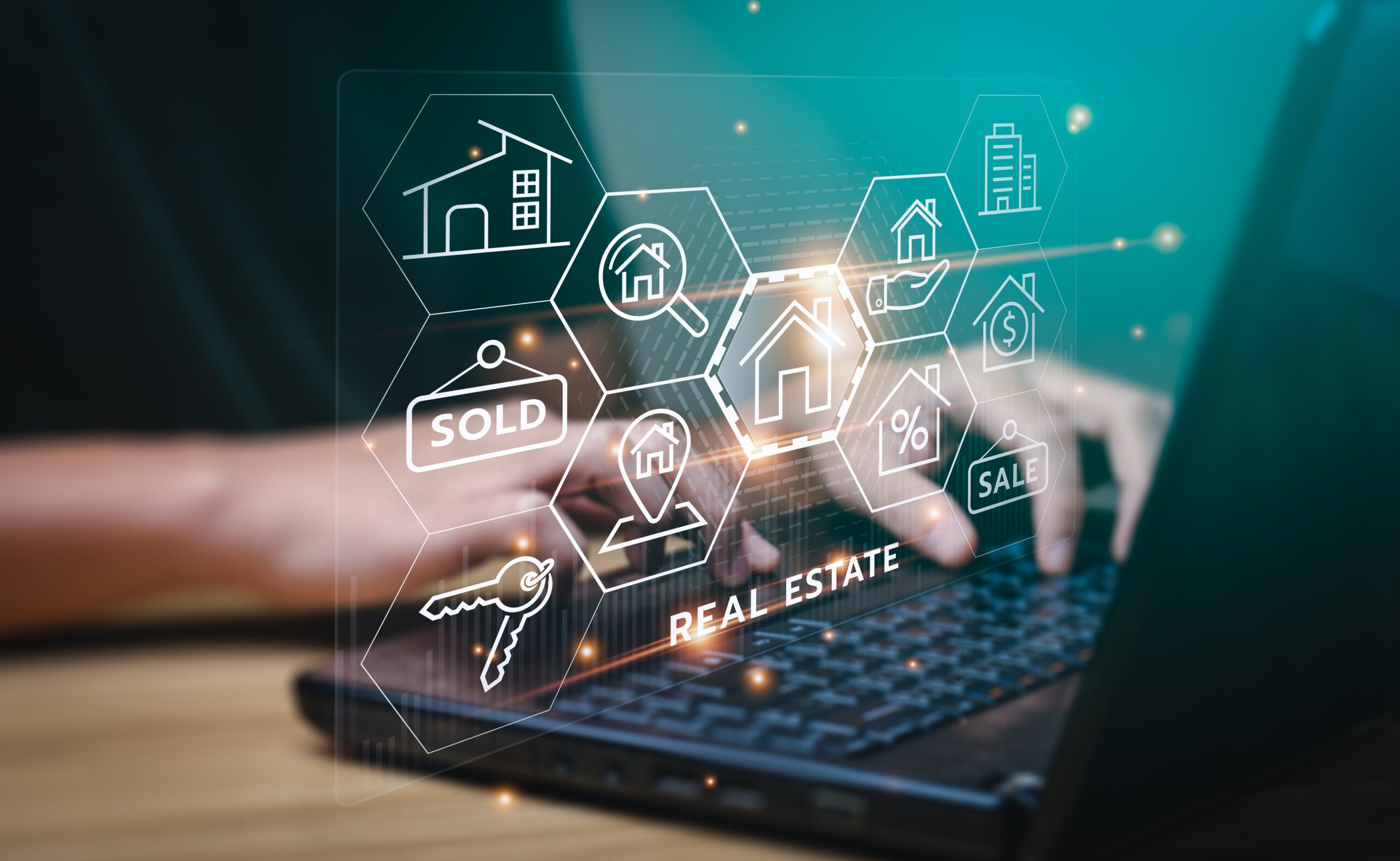The Digital Transformation of Real Estate
Traditionally, the real estate process has been heavily reliant on agents, brokers, and in-person interactions. Buyers and sellers would typically browse listings in print, attend open houses, or visit properties in person to make decisions. This traditional model often meant that buyers and sellers were constrained by time, location, and the availability of professionals to guide them through the process.
However, technology is rapidly disrupting this traditional framework. Online platforms have replaced physical listings and in-person showings with digital tools that allow users to browse properties, schedule virtual tours, and access valuable market insights—whenever and wherever they choose. From AI-powered pricing tools to virtual home tours, real estate technology is streamlining processes, improving decision-making, and providing greater convenience for both buyers and sellers.
Understanding the current and future trends in real estate technology is crucial for both industry professionals and consumers. With constant innovations in AI, blockchain, and mobile platforms, keeping up with these advancements is key to staying competitive and making informed, efficient decisions in the ever-evolving digital real estate landscape.
AI and Machine Learning: The Rise of Smart Real Estate
Artificial intelligence (AI) and machine learning (ML) are revolutionizing the real estate industry by providing smarter, more efficient tools for buyers, sellers, and investors. These technologies are being integrated into real estate platforms to enhance property valuations, predict market trends, and personalize property recommendations.
AI algorithms analyze vast amounts of data, including property features, historical sales trends, and local market conditions, to provide accurate and real-time property valuations. This helps buyers and sellers make informed decisions based on reliable data. Platforms like Zillow’s Zestimate and Redfin Estimate use AI to generate estimates of property values, adjusting for factors such as home improvements, neighborhood trends, and market fluctuations. These tools make pricing more transparent and help users gauge whether a property is priced fairly in the current market.
Machine learning, a subset of AI, plays a critical role in forecasting future market trends. By processing large datasets, ML models can predict how prices in a given area might shift over time, helping investors identify profitable opportunities and guiding buyers on when to make their move.
For example, redbriQ leverages AI-powered insights to provide predictive analytics and market forecasts, helping both buyers and sellers make data-driven decisions. As AI and ML continue to evolve, real estate platforms will become even more advanced, offering users deeper insights and smarter, more tailored recommendations.
Blockchain Technology: Ensuring Transparency and Security
Blockchain technology is quickly transforming the real estate industry by providing a decentralized and secure framework for property transactions. At its core, blockchain is a distributed ledger that records all transactions across a network of computers, making them immutable and transparent. This ensures that all parties involved in a real estate deal—whether buyers, sellers, or agents—can trust the accuracy and authenticity of the transaction data.
One of the most significant advantages of blockchain in real estate is its ability to eliminate fraud. Traditional property transactions are often complex, involving multiple intermediaries and paperwork, which increases the risk of errors or fraudulent activities. With blockchain, each transaction is recorded in a digital ledger that is visible to all participants, making it nearly impossible to tamper with the data once it has been entered. This level of transparency reduces fraud and enhances the overall integrity of the transaction process.
Smart contracts, which are self-executing agreements written directly into the blockchain, further streamline real estate transactions. These contracts automatically execute when predefined conditions are met, removing the need for manual intervention and minimizing the risk of human error.
Platforms like Propy and redbriQ are at the forefront of integrating blockchain technology into real estate transactions. By utilizing blockchain for secure property transfers, these platforms provide buyers and sellers with a more reliable, efficient, and transparent process, ensuring that every step of the transaction is securely documented and executed.
Virtual and Augmented Reality: Redefining Property Viewing
Virtual reality (VR) and augmented reality (AR) are revolutionizing how properties are viewed, offering buyers and sellers an innovative way to interact with real estate. These technologies are particularly valuable for remote buyers or those unable to attend in-person viewings. Through VR, buyers can take immersive property tours from the comfort of their homes, experiencing a 360-degree view of the property as if they were physically present. This convenience not only saves time but also allows buyers to explore multiple properties in a shorter period, broadening their options and making the decision process more efficient.
For sellers, VR and AR offer a unique opportunity to present properties in a more engaging way. Virtual home staging enables sellers to showcase the potential of a home without incurring the costs of traditional staging. By digitally furnishing and decorating rooms, sellers can highlight the space’s potential to a wider audience, enhancing the property’s appeal without the physical effort and expense.
Looking to the future, VR and AR have the potential to offer even more interactive property experiences. Integrating 3D floor plans and customization options into virtual tours could allow buyers to envision changes they might want to make to a home before committing to a purchase.
Several leading platforms are already utilizing these technologies, such as Matterport for 3D virtual tours and Redfin for interactive AR features, enhancing the way properties are displayed and viewed in real estate markets globally.
Big Data and Predictive Analytics: Smarter Decision-Making
Big data has become a game-changer in the real estate industry, enabling professionals and investors to make more informed decisions based on vast amounts of information. With access to extensive datasets—ranging from historical property prices and sales trends to neighborhood demographics and economic indicators—real estate platforms are better equipped to analyze market trends, forecast property values, and evaluate potential investment opportunities.
Predictive analytics, which uses statistical algorithms and machine learning to analyze big data, has become a powerful tool for forecasting future market conditions. It helps investors anticipate property value fluctuations, rental yields, and potential returns on investment, empowering them to make smarter decisions. For example, predictive analytics can indicate which neighborhoods are likely to experience significant price increases, allowing buyers to act early and capitalize on these opportunities.
Platforms like Redfin and redbriQ leverage big data and predictive analytics to provide users with actionable insights. Redfin uses its data to generate pricing models and market trends, while redbriQ offers investors and real estate professionals data-driven insights, such as property valuations and market forecasts.
By tapping into big data, investors can make more profitable decisions, reducing risk and enhancing returns. With real-time market insights and comprehensive historical data at their fingertips, users can assess opportunities with greater confidence and precision.
PropTech Platforms: Revolutionizing Property Management
The rise of PropTech (property technology) has drastically transformed property management, offering landlords, property managers, and tenants an array of digital solutions to streamline processes, enhance efficiency, and improve the overall experience. PropTech platforms leverage technology to automate and optimize traditionally manual tasks, making property management faster, more reliable, and more cost-effective.
One of the key benefits of PropTech is the automation of rent collection. Property managers can set up recurring payments, reducing the need for manual tracking and minimizing late payments. Additionally, tenant screening tools provided by PropTech platforms allow landlords to assess potential tenants quickly and thoroughly by reviewing background checks, credit scores, and rental history.
Maintenance tracking is another crucial feature, enabling tenants to easily submit maintenance requests, which are then tracked and resolved more efficiently. Lease management tools further simplify the management of contracts, ensuring that important deadlines, renewals, and documentation are organized and automated.
The shift towards these digital solutions not only improves operational efficiency and reduces costs but also enhances the tenant experience by providing transparency and reducing delays. Platforms like redbriQ, Buildium, TenantCloud, and Avail are leading the way in providing comprehensive property management tools. For example, redbriQ offers all-in-one solutions for property managers and landlords, from rent collection to predictive analytics, while platforms like Buildium streamline the leasing process with real-time data and automated workflows. Through these advancements, PropTech is making property management smarter, faster, and more user-friendly.
iBuyers and Instant Offers: Speeding Up Transactions
iBuyers (instant buyers) are transforming the real estate industry by offering a faster, more convenient way to buy and sell properties. Unlike traditional real estate transactions, which can take weeks or even months to finalize, iBuyer platforms provide sellers with instant offers, enabling them to sell their homes quickly with minimal effort. These platforms use advanced algorithms to assess a property’s value, based on factors such as location, market trends, and home features, providing sellers with competitive cash offers often within 24 hours.
For sellers, the main appeal of iBuyers is the ability to close deals quickly, usually within a matter of days, and without the usual complexities of showings, negotiations, and repairs. This hassle-free process is particularly attractive for homeowners in urgent situations or those looking to avoid the traditional listing process.
For buyers, iBuyers offer a streamlined purchasing experience, with fewer hurdles and faster transactions. The ability to buy homes directly from the platform eliminates the uncertainty and delays typical in traditional real estate dealings.
Key players in the iBuyer market include Opendoor, Redfin, and Offerpad, all of which have pioneered automated home buying and selling. These platforms are shifting traditional real estate practices by reducing negotiation and offering more transparency in pricing. As iBuyers continue to grow, we can expect to see further innovations that could redefine how properties are bought and sold in the future.
Smart Homes and IoT Integration: Enhancing Property Value
The demand for smart home technologies has surged in recent years, driven by the desire for convenience, efficiency, and security in modern living spaces. At the heart of this transformation is the Internet of Things (IoT), a network of interconnected devices that communicate with each other and can be controlled remotely. These innovations are reshaping the real estate market by offering homeowners and potential buyers greater control over their properties.
Smart home features such as security systems, thermostats, lighting, and appliances are increasing the value of homes, as they not only offer convenience but also improve energy efficiency and security. Buyers are increasingly drawn to homes equipped with these technologies, as they align with the growing desire for sustainable living and enhanced security. Features like smart doorbells, smart locks, and motion sensors allow homeowners to monitor their property from anywhere, offering peace of mind and real-time control.
For property managers, IoT devices offer significant advantages, such as real-time monitoring of utilities, remote access to building systems, and predictive maintenance to anticipate issues before they become costly problems.
Looking to the future, smart homes will likely continue to evolve, incorporating energy-efficient technologies, voice-assisted systems, and more advanced integrations for seamless user experiences. Real estate platforms are increasingly adopting smart home features, with companies like redbriQ providing access to properties with IoT devices integrated into their listings, allowing buyers to view and explore these advanced home features directly from the platform.
Mobile Accessibility: The Shift Towards Mobile-First Real Estate
In today’s fast-paced world, mobile accessibility has become a key factor in the real estate market, with more buyers, sellers, and agents relying on mobile devices to stay connected and manage transactions on-the-go. The shift towards mobile-first real estate platforms ensures that users can access property listings, schedule tours, and track transactions from anywhere, at any time, providing unparalleled convenience and flexibility.
Mobile-friendly platforms have become essential for today’s real estate experience. They offer real-time notifications on new listings, price changes, and market trends, allowing buyers and sellers to stay updated instantly. Additionally, location-based search functionalities help users find properties tailored to their specific geographical preferences, enhancing the search process. For agents, mobile apps enable seamless communication with clients, quick scheduling of property showings, and the ability to manage listings remotely.
As mobile-first real estate platforms continue to grow, we can expect further enhancements in user experience. Future developments will likely include responsive designs that adapt to various devices and more user-friendly interfaces. Real estate platforms that prioritize mobile accessibility will remain at the forefront of the market, meeting the demands of an increasingly mobile-savvy audience.
The Future of Real Estate Platforms: Embracing Innovation
The real estate industry is undergoing a rapid transformation, driven by several key technological innovations. Trends such as AI, blockchain, smart homes, PropTech, and mobile platforms are reshaping how properties are bought, sold, and managed. AI-driven tools offer personalized recommendations, accurate market predictions, and streamlined decision-making, while blockchain technology ensures transparency and security in transactions. Smart home devices are enhancing property value, and PropTech solutions are revolutionizing property management with automation and real-time insights.
Looking ahead, the integration of real-time data and automated services will continue to evolve, making the real estate process even more efficient, secure, and customer-centric. Platforms will be increasingly designed to leverage AI and machine learning for better insights and faster transactions.
Staying ahead in the digital real estate world will require a focus on adaptability and a commitment to embracing forward-thinking technologies. Platforms like redbriQ are at the forefront of this innovation, offering an all-in-one solution that seamlessly integrates the needs of buyers, sellers, and professionals. As the industry continues to evolve, staying updated with cutting-edge tech will be essential for success in the ever-changing real estate market.



